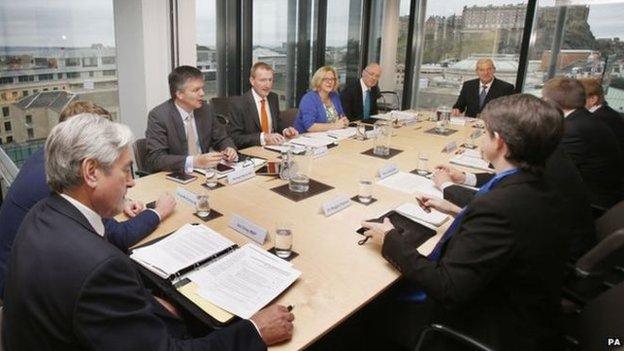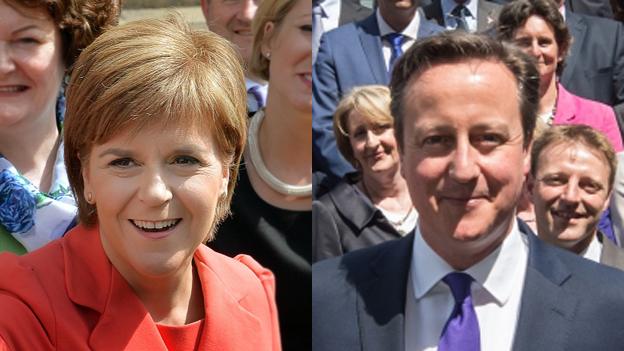Holyrood powers bill 'falls short' of Smith proposals
- Published
Lord Smith of Kelvin headed up the cross-party commission into new powers for Scotland
Plans for new Holyrood powers fall short of recommendations made by the cross-party backed Smith Commission, external, a report by MSPs has said.
The Devolution (Further Powers) Committee, external said the UK government's draft legislation did not meet the "spirit or substance" of Smith.
It added that parts of the plan required "extensive redrafting".
A Scotland Office spokesman responded by saying there would be a full parliamentary discussion to follow.
Following the "No" vote in September's referendum, the then Conservative/Liberal Democrat coalition government appointed Lord Smith of Kelvin to look into more devolved powers for the Scottish Parliament.
His commission reported in November last year and recommended that Holyrood should have the power to set income tax rates and bands.
It also said a share of VAT should be assigned to the parliament, Air Passenger Duty should be fully devolved, and Holyrood should be given control over some benefits.

The Smith proposals were drawn up by representatives of the five Holyrood political parties
But Holyrood's devolution committee convener Bruce Crawford, an SNP MSP, said: "The committee believes that the current proposals do not yet meet the challenge of fully translating the political agreement reached in the Smith Commission into legislation.
"For example, as we heard in our evidence taking, there is no power for the Scottish Parliament to top up reserved benefits despite that being one of the powers highlighted at the time of publication.
"The committee also seeks reassurance that any new benefits or top-up benefits introduced in Scotland would result in additional income for a recipient."
Mr Crawford added: "In the immediate aftermath of the UK general election, the prime minister indicated that he was committed to delivering on the recommendations of the Smith Commission.
"As a committee we call on the new UK government to consider our report - agreed unanimously - as a matter of urgency and to work with the Scottish Parliament to help ensure that we have legislation that achieves the objectives that all five parties on the committee signed up for."

Analysis: Glenn Campbell, Political correspondent BBC News
Before the haggis, neeps and tatties were served on Burns night, the UK government said it would dish up draft legislation on further devolution to Holyrood.
The then Scottish secretary, Alistair Carmichael, published the promised clauses in good time and claimed they would deliver "in full" the Smith Commission recommendations.
Holyrood's devolution committee has studied the details and reached a very different conclusion.
The committee's convenor, Bruce Crawford, said the draft legislation was "not fit for purpose" and gave it five marks out of ten.
His committee notes particular concern that the welfare clauses do not match the "spirit and substance" of Smith.
For instance, they said the promised power for Holyrood to top up UK benefit payments had not been translated into law.
The new Scottish secretary, David Mundell's office said the UK government was still committed to delivering the Smith package and making Holyrood one of the world's most powerful devolved parliaments.

The interim report was agreed by the committee before the general election. Mr Bruce said it had been published as a constructive set of proposals to the new UK government to consider seriously before it holds its Queen's Speech or before any Scotland Bill is introduced.
Deputy First Minister John Swinney said: "I share the committee's concern that in a number of key areas, particularly in relation to welfare, the draft clauses do not meet the spirit or substance of Smith. I expect the UK government to take the unanimous views of the devolution committee very seriously and amend the Scotland Bill before it is introduced.
"As the first minister told parliament yesterday, we will press the prime minister to devolve further job creating and revenue-raising powers to the Scottish Parliament.
"Within that context we will continue to put forward constructive proposals to ensure UK legislation delivers both the spirit and letter of agreements between the Scottish and UK governments."
The Scotland Office said the UK government was committed to delivering more devolved powers "through the package outlined by the cross-party Smith Commission".
The spokesman added: "We will work to bring forward a Scotland Bill on this basis and ensure the Scottish Parliament becomes one of the most powerful devolved parliaments in the world.
"The Secretary of State has been clear there will be a full parliamentary discussion of these issues where differing views can be heard."
The main area of concern highlighted by the committee were:
Welfare
The committee said it was concerned with a number of the welfare provisions and said the relevant clauses "do not yet meet the spirit and substance of the Smith Commission's recommendations and potentially pose challenges in any attempt to implement them."
It also reaffirmed the agreement in the Smith Commission report that the Scottish Parliament should have the power to create new benefits in areas of devolved responsibility and also have new powers to make discretionary payments in any area of welfare without the need to obtain prior permission from the Department for Work and Pensions.
Income tax
Committee members said there were significant issues still to be resolved regarding the implementation of the new powers, such as an appropriate definition of residency for a Scottish taxpayer, the details of the administration of the new regime, the costs on business and individuals and the need to avoid double taxation and the timing and phasing of the new powers on income tax "relative to those already devolved under the Scotland Act 2012".
Fiscal framework
The committee said that any final detail of the fiscal framework and the other matters it considered should be provided to the Scottish Parliament before the question of legislative consent to any new bill is considered in the early months of 2016.
Intergovernmental relations
The committee report concluded that ensuring that the Scottish and UK Parliaments, and other devolved assemblies, could effectively scrutinise inter-governmental relations represented a "significant challenge posed by the Smith Commission for these legislatures."
In areas such as taxation, fiscal framework and welfare it said: "We recommend both governments reach an urgent agreement on just how this [intergovernmental relations and agreements] will be achieved and for the Scottish government to report to the committee on what arrangements it proposes to put in place for parliamentary oversight."
The Crown Estate
Members said they had "serious concerns" regarding the situation in Scotland post-devolution and the competition and confusion that may arise from the creation of 'two Crown Estates'.
Scottish Parliament permanency
The committee recommended that the Scottish electorate should be asked to vote in a referendum if the issue of permanency was in question, with majorities also being required in the Scottish Parliament and the UK Parliament.
- Published14 May 2015
